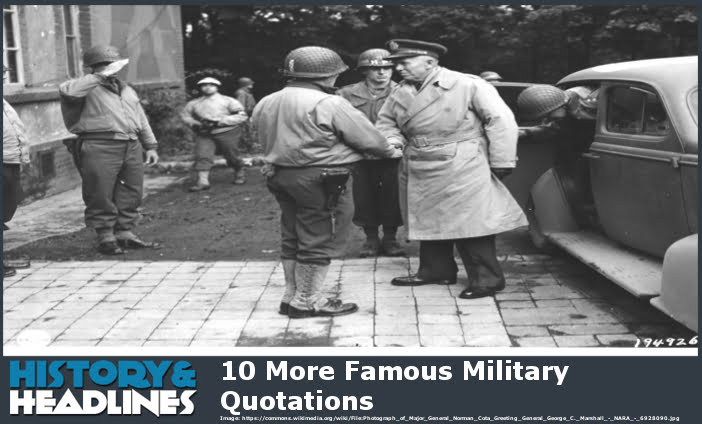A Brief History
On June 6, 1944, the character played by Robert Mitchum in the movie The Longest Day (1960), Brigadier General Norman Cota, makes a stirring announcement to his men who are under heavy enemy fire and terrified of moving forward: “Only two kinds of people are gonna stay on this beach — those that are already dead and those that are gonna die. Now get off your butts! You guys are the Fightin’ 29th!” It turns out Norman Cota was a real US Army General (eventually Major General) and he really did rally his men of the 29th Division at Omaha Beach on D-Day at Normandy, France, personally leading them up and off the beach, earning a Distinguished Service Cross for his gallantry. Previously we published an article, “10 Famous Military Quotations,” dated June 1, 1813. Today, we add these great quotations to that list.
Digging Deeper
1. Brigadier General Norman Cota or Colonel George Taylor, US Army, June 6, 1944. “There are only two kinds of people who are staying on this beach: those who are already dead and those that are gonna die. Now get off your butts, you’re the fightin’ 29th.”

On D-Day, Omaha Beach at Normandy, France, was a virtual hellish scene. Aerial and naval bombardment had scarcely affected the defenses and defenders of the heavily armed Atlantic Wall, and American Army troops were being shot to ribbons. Sherman tanks rigged to swim to shore did not make it in the heavy waves and the situation grew desperate for the Americans. As one of the most senior soldiers to arrive on Omaha Beach, Brigadier General Cota felt a keen responsibility to get his men up and moving inland or else they would be slaughtered by the heavy fire coming at them. Whether or not the movie quote is an exact quote is irrelevant, as the fact is Cota achieved the motivation needed to get the men moving, undoubtedly contributing to saving American lives and the success of the D-Day landings at Omaha Beach. Colonel George Taylor was the commanding officer of the 16th Infantry Regiment and is probably the officer that actually spoke the famous quote. Taylor also earned a Distinguished Service Cross on D-Day for his heroism.
2. Brigadier General Norman Cota, US Army, June 6, 1944. “Well, God damn it then, Rangers, lead the way!”

Did you think a soldier this gallant and brave would have only one measly D-Day quotation worth mentioning? Well, he had another classic that same day. When the Assistant Division Commander landed on Omaha Beach under heavy fire, he found soldiers reluctant to advance into the teeth of German machine gun fire. He asked a soldier what unit he was with, and the soldier replied, “The 5th Ranger Battalion, Sir!” Cota snapped, “Well, God damn it then, Rangers, lead the way!” Ever since that day the motto of the US Army Rangers, an elite fighting force, has been, “Rangers lead the way!” The soldier Cota had confronted was the commanding officer of the 5th Ranger Battalion, Lt. Colonel Max Schneider.
3. General Douglas MacArthur, US Army, March 20, 1942. “I came through and I shall return!”
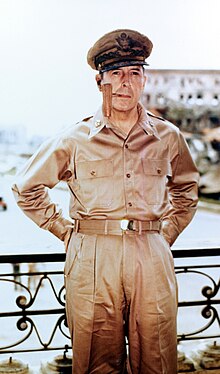
Douglas MacArthur may have been a pompous and self-aggrandizing egoist, but he did have a way about words, often making inspiring and memorable quotations and speeches. After losing the Philippine Islands early in World War II, the General made a couple of radio broadcast versions of his speech promising the Philippine people that not the United States, or the United States Army, but that HE himself would return to the Philippines, presumably as their savior from tyrannical and brutal Japanese occupation. In this case, MacArthur argued forcefully and eloquently before President Roosevelt and was granted the opportunity to reclaim the Philippines instead of by-passing the islands in favor of a more direct approach to Japan as favored by Admiral Chester Nimitz. Upon his “return,” MacArthur made good use of propaganda film of himself wading ashore in a staged film opportunity, more or less cementing his position in Philippine History as a God of War.
4. 1st Sergeant Daniel Joseph Daly, US Marine Corps, June 6, 1918. “Come on, you sons of bitches, do you want to live forever?”
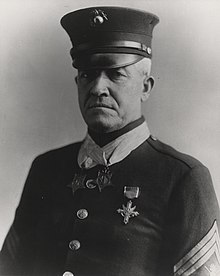
Daly, later a Sergeant Major, is a Marine Corps legend. Having won not 1, but 2 Medals of Honor, he added a Navy Cross and a Distinguished Service Cross to his resume. At the Battle of Belleau Wood in France on June 6, 1918, Daly rallied the men of the 73rd Machine Gun Company of the 3rd Battalion, 6th Marine Regiment. The words were reported by Chicago Tribune reporter Floyd Gibbons, but Daly later said his exact words were, “For Christ’s sake men—come on! Do you want to live forever?” Either way, his stirring words and example got the men moving forward in the attack. Daly was actually nominated for a third Medal of Honor for his actions at Belleau Wood, but some jerk in Washington thought one guy earning 3 Medals of Honor was a bit much, so the nomination became a Distinguished Service Cross. In a somewhat similar vein, Frederick the Great of Prussia said, “Lads, do you want to live forever?” (of course he said it in German) to his retreating troops in 1757 at the battle of Kolin. The famous quote, or variations of it, have been used in movies and television shows.
5. Captain Lloyd W. Williams, US Marine Corps, June 2, 1918. “Retreat hell! We just got here!”

Williams was later posthumously promoted to Major after being killed in action at Belleau Wood, near Chateau Thierry on June 11, 1918, from wounds caused by shrapnel. (He had also been gassed.) As Williams lay grievously wounded, the ordered the medical corpsman, “Don’t bother with me. Take care of my good men.” The valor shown by this great Marine officer is what one would expect from a Marine that had arrived with his unit in order to reinforce beleaguered French forces facing stiff German attacks at Belleau Wood when the French Colonel advised the newly arrived Marines to turn around and retreat. Williams was awarded 3 Silver Star medals, although he had been nominated for the Medal of Honor and the Distinguished Service Cross. Of the 250 Marines and 10 officers taking part in the action in which Williams was killed, only 1 officer and 16 Marines remained intact. The sort of heroism in the face of extreme danger shown by Dan Daly and Lloyd Williams and their Marines is exactly why the US Marine Corps has a reputation as indomitable fighting machines.
6. Lieutenant General Lewis B. Puller, US Marine Corps, unknown date. “Paperwork will ruin any military force.”

“Chesty” Puller was one of the most highly decorated American fighting men of all time, awarded 5 Navy Cross Medals and a Distinguished Service Cross as well as a Silver Star. Only Captain Eddie Rickenbacker of World War I flying ace fame won more of our nation’s top medals (1 Medal of Honor and 7 Distinguished Service Cross Medals) than Puller. Chesty enlisted in the USMC after leaving Virginia Military Institute in order to fight in World War I but graduated from Officer Candidate School too late to see combat. Puller saw action in Haiti, Nicaragua and China before World War II provided the grand stage for his incredible bravery and leadership, starting on Guadalcanal in 1942. Puller also saw action on Peleliu and during the Korean War, earning fame for his valor at the Chosin Reservoir, saying, “We’ve been looking for the enemy for some time now. We’ve finally found him. We’re surrounded. That simplifies things.” Puller’s brother was killed by a Japanese sniper on Guam in World War II, and during the Vietnam War Lewis B. Puller, Jr., Chesty’s son, was horribly maimed losing both legs and parts of both hands. Puller actually uttered many seriously profound military related quotes, though some are longer than we wanted to use for this article. When Puller was seriously wounded in the arm and leg on Guadalcanal he was about to be evacuated when he said, “Evacuate me, hell! I will remain in command!” Among his memorable brief quotes are, “You don’t hurt ’em if you don’t hit ’em.” (regarding marksmanship) and “You’ve got bayonets, haven’t you?” to an officer advising him his men were low on ammunition at Guadalcanal. One of my favorites is Chesty exclaiming that his men “fight better on whiskey than on ice cream!” (A version of the quote is, “Get the girls out of camps. Get rid of the ice cream and candy. Give ’em beer and whiskey.”)
7. General George S. Patton, US Army, unknown date. “Never tell people how to do things. Tell them what to do and they will surprise you with their ingenuity.”
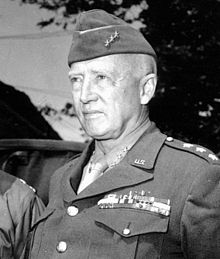
George Patton has lots of excellent military related quotations to his credit, some of which were colorfully depicted by actor George C. Scott playing the outspoken General Patton in the classic 1970 movie, Patton. The quote listed here is one of those that are equally applicable to business and other pursuits in life where the idea is to avoid over-supervision and micro-management. By giving someone a goal to achieve instead of trying to control every step they take along the way, the leader can be free to pursue other pressing needs and not get tied down in minutiae. Since this is our favorite Patton quote, but might not be yours, we will list a couple more of his verbal gems to please our valued readers! On the subject of dying, “The object of war is not to die for your country, but to make the other bastard to die for his.” How about this one, also applicable to other than military situations? “If everyone is thinking alike, then somebody isn’t thinking.” In this quotation, Patton recognizes that leadership means quite literally, leading. “A piece of spaghetti or a military unit can only be led from the front end.” This quote is also applicable to civilian endeavors. So as not to overwhelm the reader on George S. Patton quotes, we will end with, “A good plan violently executed now is better than a perfect plan executed next week.” (The author has seen timid leaders making never ending ordeals out of trying to perfect a plan to the point that nothing gets done, at least not in time. Patton understood this idea.)
8. Unknown author, unknown date. “People Sleep Peacefully in Their Beds at Night Only Because Rough Men Stand Ready to Do Violence on Their Behalf.”
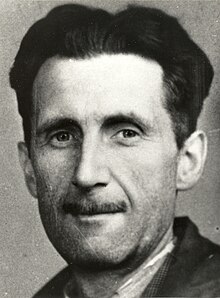
This quotation and variations of it have been attributed to a variety of sources, notably authors George Orwell and Rudyard Kipling. Here is another version, “We sleep soundly in our beds because rough men stand ready in the night to visit violence on those who would do us harm.” In 1993, a newspaperman, Richard Grenier, attributed the saying to George Orwell, but without documentation. Regardless of who said the quote and when, or exactly how, the idea that pacifists can afford to be pacifists only because warriors risk their lives and limbs to keep those milquetoasts safe is an eternal truth. The question, “What if we had a war and nobody came?” is a naïve, nay, an idiotic sentiment because the other side will certainly show up and either take your stuff or kill you. This is just human reality. Call the military “baby killers” but scream for their protection when the enemy is at the gates, an enemy that will pillage, rape, torture and kill, and ultimately enslave. Call the police “pigs,” but you will not be calling a drug dealer for help when you are being mugged or have some other emergency. This author hereby forcefully states that those who would denigrate our fighting men and women are hypocrites and cowards, as this “quote” would imply.
9. Admiral David Beatty (1st Earl Beatty), Royal Navy, May 31, 1916. “There seems to be something wrong with our bloody ships today.”

This particular quotation is neither inspiring or wisdom for the ages, but it is instead a famous quotation by a high ranking officer regarding the futility of war. Early during the Battle of Jutland, the largest naval battle of World War I, the British Admiralty certainly thought their Royal Navy was clearly the master of the seas and that the German Imperial Navy would be brushed aside like amateurs. The British were mistaken, as the quality of the German ships and sailors was very much the equal of the larger British fleet. Although the Battle of Jutland can be considered a British victory because it contained the German High Seas Fleet and forced it to return to German waters, the British losses far outweighed those of the Germans. The Royal Navy lost over 6000 dead, 3 battlecruisers, 3 armored cruisers and 8 destroyers while German losses were only 2551 killed, 1 battle cruiser, 1 pre-Dreadnaught type battleship, 4 light cruisers and 5 torpedo boats. British tonnage sunk was 113,000 tons to German tonnage sunk of 62,000 tons. The aftermath of the battle was that the German fleet remained a non-factor for the rest of the war, so the British did win in a way, but at a price. The observation by Admiral Beatty is the crushing realization that there are no assumptions to be taken for granted in war.
10. Major General John Sedgwick, US Army, May 9, 1864. “They couldn’t hit an elephant at this distance!”

The last words of Union Major General John Sedgwick during the American Civil War were in response to his men cringing and ducking from long range Confederate sniper fire, about 1000 yards away. Given the nature of rifles of that time, such a distance was believed (by Sedgwick!) to be beyond the accurate range of rifles. The good general did not count on the skill of the Confederate marksmen or the quality of their Whitworth Rifles, muzzle loading single shot black powder rifles with a hexagonal polygonal bore instead of normal cut rifling that used a unique hexagonal bullet. Often used with early telescopic sights, the Whitworth was the first real sniper rifle used in combat. Sedgwick’s extended comments were, “What? Men dodging this way for single bullets? What will you do when they open fire along the whole line?” He then went on to say, “Why are you dodging like this? They couldn’t hit an elephant at this distance!” A moment later, Sedgwick became 1 of only 2 Union Major Generals to die in combat during the Civil War, shot right through the old coconut. An old woodsman’s saying goes, “If all the animals are running in one direction, you better start running in that same direction!” Perhaps the lesson from Major General Sedgwick’s unfortunate quote is that when the enlisted men are taking cover, perhaps the officers should as well!
Question for students (and subscribers): As always, you are invited to nominate other quotes you think deserve mention in the comments section below this article.
If you liked this article and would like to receive notification of new articles, please feel welcome to subscribe to History and Headlines by liking us on Facebook and becoming one of our patrons!
Your readership is much appreciated!
Historical Evidence
For more information, please see…
Foxx, Daniel. A Book Of Military Quotes: of Soldiers, Sailors, Marines, and Airmen of the Five American Military Branches. Draytonville Publications, 2016.
Kremling, Mick. Daily Military Quotes. CreateSpace, 2016.
The featured image in this article, a photograph of Major General Norman Cota greeting General George C. Marshall, was provided to Wikimedia Commons by the National Archives and Records Administration as part of a cooperation project. The National Archives and Records Administration provides images depicting American and global history which are public domain or licensed under a free license. This image is a work of a U.S. military or Department of Defense employee, taken or made as part of that person’s official duties. As a work of the U.S. federal government, the image is in the public domain in the United States.

